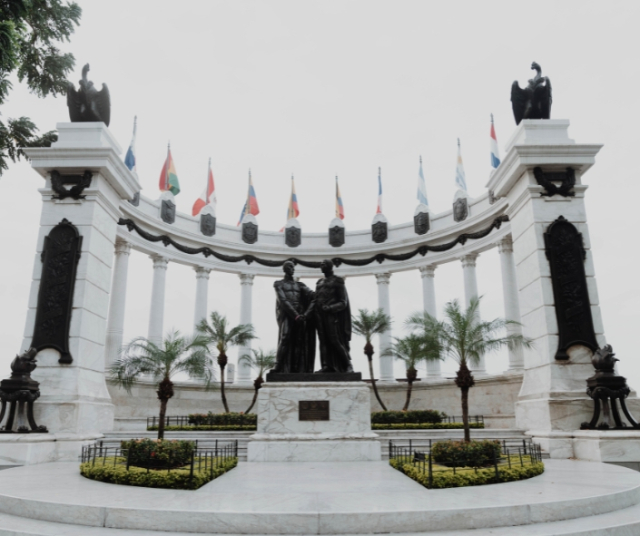July 25, 1538 marks a significant milestone in the history of Ecuador and Latin America in general: the founding of Guayaquil, one of the most important and emblematic cities in the country. In this article, we will delve into the history, culture, and meaning behind the founding of Guayaquil, exploring the events that led to its establishment, its evolution over the centuries, and its impact on Ecuadorian society.
The Origins of Guayaquil:
Before the arrival of the Spanish to the region, the area we know today as Guayaquil was inhabited by various indigenous cultures, including the Huancavilcas and the Chonans. These cultures had a long history of trade and navigation along the Pacific coast, using the region's rivers and estuaries to exchange goods and products with other communities.
The arrival of the Spanish conquistadors to the region in the 16th century brought with it a period of change and transformation for Guayaquil. In 1534, Francisco de Orellana, a Spanish explorer, founded the city of Santiago de Guayaquil on the banks of the Guayas River, thus establishing a permanent settlement in the region. However, the city was abandoned shortly after due to conflicts with the local indigenous populations.
Guayaquil Foundation:
The founding of Guayaquil on July 25, 1538 marked a crucial point in the history of Ecuador and Latin America in general. This event not only established a permanent colony in the region, but also laid the foundation for the subsequent growth and development of one of the most important and prosperous cities in the country.
The founding process of Guayaquil was marked by a series of challenges and difficulties that the Spanish colonizers faced when establishing a colony in an unknown and hostile territory. The first attempts to establish a colony in the region, led by Francisco de Orellana in 1534, resulted in failure due to conflicts with local indigenous populations and the difficult climatic and geographical conditions of the area.
However, Orellana's vision of establishing a permanent settlement in the region did not fade, and in 1538 he returned to the region with a group of Spanish settlers determined to establish a colony on the banks of the Guayas River. This second attempt was more successful, and on July 25, 1538, Orellana and his men officially founded the city of Santiago de Guayaquil on the site where the modern city now stands.
The choice of the site for the founding of Guayaquil was not accidental. The city's strategic location on the banks of the Guayas River made it an important center of commerce and navigation in the region. The Guayas River provided a vital route for transporting goods between the coast and the interior of the country, facilitating the exchange of goods and products between local communities and Spanish settlers.
The founding of Guayaquil also had symbolic meaning for the Spanish colonists and for the Spanish empire in general. The city became a symbol of Spanish rule in the region and a crucial starting point for the empire's expansion into Latin America. Furthermore, the founding of Guayaquil laid the foundation for the establishment of a network of cities and colonies along the Pacific coast, which would play a crucial role in the control and administration of the colonial territory.
Evolution of Guayaquil throughout the Centuries:
Over the centuries, Guayaquil experienced significant growth and development, becoming one of the most important and prosperous cities in Ecuador. During the colonial era, the city became an important center of commerce and navigation in the region, with the construction of ports, docks and warehouses that facilitated the transportation of products between the coast and the interior of the country.
In the 19th century, Guayaquil emerged as an important economic and cultural center in Ecuador, with the arrival of the cocoa boom that transformed the region's economy. The city became an important export port for cocoa, attracting merchants, businessmen and workers from all over the country and abroad.
Meaning of the Foundation of Guayaquil:
The founding of Guayaquil on July 25, 1538 has a deep and lasting meaning for the inhabitants of the city and for all the Ecuadorian people. Beyond being simply a date on the calendar, this celebration is a reminder of the pioneering and entrepreneurial spirit of the city's founders, who dared to establish a colony in a remote and unknown place in search of new opportunities and adventures.
For the inhabitants of Guayaquil, the founding of the city is a time to celebrate their identity and cultural heritage, as well as to reflect on the role the city has played in the history of Ecuador and Latin America in general. Guayaquil has become a symbol of progress and development in the region, with a diversified economy, a vibrant cultural scene and a diverse and dynamic population.
Guayaquil Day Celebration:
July 25 is a holiday in Guayaquil, with celebrations and special events throughout the city. Parades, concerts, fairs and other cultural activities are held to commemorate the founding of the city and to celebrate its history and cultural heritage.
The founding of Guayaquil on July 25, 1538 is a significant moment in the history of Ecuador and Latin America in general. Beyond simply being a date on the calendar, this celebration is a reminder of the pioneering and entrepreneurial spirit of the city's founders, as well as the importance of Guayaquil in the history and culture of Ecuador.
